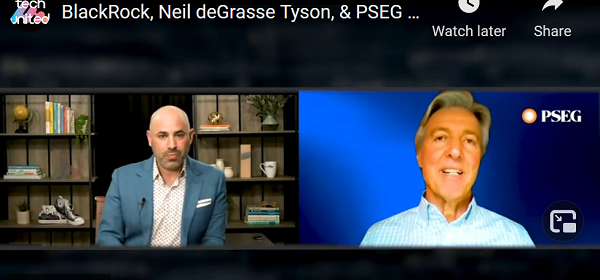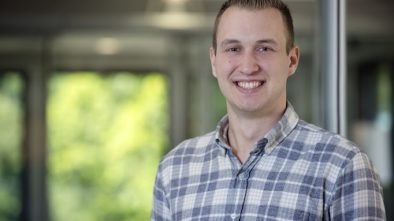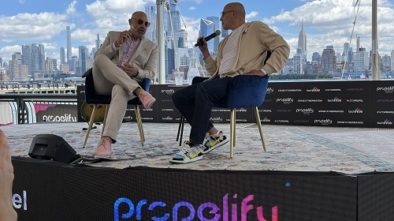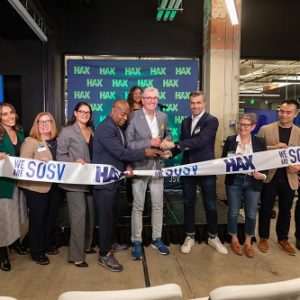TechUnited:NJ BetterPlanet Launch Event Highlights Importance of Electrifying Transportation, Reducing Range Anxiety
There’s Still Time to Apply for TechUnited:NJ and PSEG’s $50K BetterPlanet Challenge.
On April 22, Earth Day, TechUnited:NJ and PSEG launched this year’s TechUnited:BetterPlanet Challenge, with a $50,000 cash prize for the startup with the most innovative solution for realizing equitable electrified transportation. The deadline for applications is August 13. A video of the event can be found here.
This is the second year of the competition. Last year’s event focused on cleantech innovations from promising startups that focused their skills and imaginations on equity workforce transformation, to help address economic and industry disparities.
This year’s challenge focuses on reducing New Jersey’s carbon footprint through the expanded use of electric vehicles, as well as enhancements to the infrastructure that supports them, including more readily available charging stations.
The launch event started off with a conversation with the founders of WexEnergy, the Rochester, New York, company that had won the competition in 2020. WexEnergy makes WindowSkin, a low-cost window-insulation treatment for office buildings and other large older buildings. Part of the reason WexEnergy won was that the company uses local installers, thus providing area residents with employment in the energy economy.
The event host, Aaron Price, president and CEO of TechUnited:NJ, asked the WexEnergy founders about the second part of the prize: fast-track access to PSEG executives who help the winners with their business. Rachel Rosen, cofounder and CEO of WexEnergy, stated that PSEG provides excellent mentorship and assistance to help the winning startup achieve its goals.
“What’s really atypical is that the competition sponsor like PSEG often just cares about their own PR opportunity, and that is not the case here. PSEG really cares about its mission and its customers, and they really care about helping us achieve our mission. … They’re really giving us a lot of support to help us get there,” she said.
During a recorded message, Governor Phil Murphy said that he was excited about the 2021 BetterPlanet Challenge and its focus on the electrification of our transportation infrastructure, and about the prospect of an equitable adoption of electric vehicles.
“New Jersey is the ultimate corridor state. Our transportation networks — our roads, bridges, rails and ports — are the vein through which hundreds of billions of dollars in economic benefits flow. Modernizing our key infrastructure to be more sustainable over the long term is critical to our economic prowess. And we must ensure that these benefits are born from a core belief in environmental justice and economic and social equity.”
During his talk Ralph Izzo, Chair and CEO of PSEG, noted that this challenge was important from an environmental standpoint. “Transportation is the number-one emitter of carbon in New Jersey. … As efficient as internal combustion engines have become, they do make other pollutants, as well. And New Jersey, being the most densely populated state in the nation, does have some commuting challenges and does have some air-quality challenges. So, electrification of transportation would go a long way to solving some of those environmental challenges,” he said.
“When you look at the conditions in New Jersey, it really does result in you scratching your head to say, ‘Why don’t we have more electric vehicles in the state, and derive those benefits that we just alluded to a moment ago?’ We have this high population density and short-term resistances, and a mass transit system that’s functional but not ubiquitous. Candidly, right now, electric vehicles are not affordable for everyone.”
Izzo noted that the biggest impediment in the market for electric vehicles is range anxiety. “In the absence of charging infrastructure, you don’t have people buying electric vehicles. And in the absence of people buying electric vehicles in New Jersey, we don’t have people coming in to put the infrastructure.” He said that PSEG had asked regulators to allow it to invest in charging infrastructure, so the company could mitigate some of this range anxiety. The utility is first concentrating on highly traveled cars, that “serve public good,” such as school systems and municipal fleets. “And then maybe the market will take off,” he said.
He added that the exciting part about working with TechUnited:NJ is that there are a lot of entrepreneurs out there who probably have ideas “to move, as the phrase goes, ‘beyond the price curve,’ to make it more affordable to have all components of the population and all demographics have access to electric transportation.”
For the entrepreneurs, while the $50,000 is nice, the real prize is brand recognition, the ability to launch an alpha or beta project with a well-respected company, and the ability to use that “as you knock on the door of others,” he said. It’s a great opportunity to get to work with a company that will be investing, as a utility, $166 million in electric vehicles in the next few years, “courtesy of the [New Jersey] Board of Public Utilities.”
Another speaker was Robert Kapito, president and director of BlackRock (Princeton), a $9 trillion asset management company. However, at one point he had also been an entrepreneur. “I still consider myself an entrepreneur,” he said. “We are coming up with new ideas and new investment opportunities and new types of what I call ‘wrappers’ to present those to different clients. But our genesis was that we noticed people did not understand the risk that they were taking in their investments. And I also understood that most clients that invest never remember when they make money, but they remember every single time they lost money. So, we came up with some technology that would help people understand the risk, and therefore get the type of returns that they would need for the long term, so that they could retire in dignity.”
Price asked him about where the current opportunities for investors were, and he said, “Take the friction out of a business that currently exists. Try to find ways to streamline it, make it more convenient, make it more accessible to a wider group of people. And use technology for that. Analytics are very, very powerful. … We need data, we need information.” He continued, “It’s a very simple model, but it’s one that is the common thread of the most successful companies today. Take into account that you can have a great company, your employees can do well, your clients can do well, and your shareholders can do well, and you can have a social impact, which is good. It can be done. We just have to focus on it and want to do it




